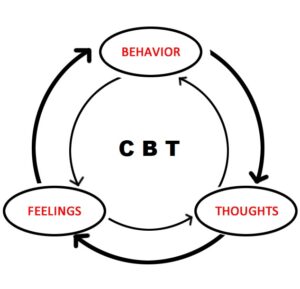Schizophrenia is a severe mental disorder that affects millions of people worldwide. It can cause delusions, hallucinations, and disordered thinking, making it challenging for patients to perform daily activities such as work or socializing. However, with the right psychological treatment approach and support system in place, individuals living with schizophrenia can manage their symptoms effectively and lead fulfilling lives. In this blog post, we’ll explore how psychological treatments are helping those diagnosed with schizophrenia manage their condition better than ever before!
Contents
What is Schizophrenia?

Schizophrenia is a mental disorder that affects a person’s ability to think, manage emotions, make decisions, and relate to others. The symptoms of schizophrenia can be divided into three types: positive, negative, and cognitive.
Positive symptoms are those that are not seen in healthy people. They include hallucinations, delusions, and thought disorders. Negative symptoms are those that involve a loss or decrease in normal functions. These include social withdrawal, apathy, and flat affect. Cognitive symptoms are deficits in executive functioning – the ability to plan, organize, and pay attention.
The causes of schizophrenia are not fully understood but it is believed to be a combination of genetic and environmental factors. People with certain genes may be more likely to develop the disorder if they experience stressful life events.
Psychological Treatment for Schizophrenia
Psychological treatment, also known as psychotherapy or talk therapy, is a key part of schizophrenia treatment. It can help people with schizophrenia manage their symptoms and improve their quality of life.
Psychotherapy can take many different forms, but all types of therapy share the goal of helping people understand and cope with their illnesses. Therapists can provide support, problem-solving skills, and education about schizophrenia. They may also use techniques to help people manage stress and identify and change negative thinking patterns.
The Different Types of Psychological Treatment
The main types of psychological treatment are:
Cognitive Behavioral Therapy

One of the most common treatments used in schizophrenia, cognitive behavioral therapy (CBT) focuses on helping people identify and change negative thinking patterns. Through CBT, people can learn to recognize and challenge irrational beliefs that may be causing distress or leading them to act in harmful ways.
The techniques of this therapy include the following:
- Relaxation training
- Cognitive restructuring
- Social skills training
- Self-monitoring strategies
Interpersonal Therapy
This form of therapy focuses on improving communication and relationships. Interpersonal therapy helps people with schizophrenia learn to understand and express their emotions more effectively. It also teaches them how to interact with others and develop healthier relationships.
Some of the techniques used in interpersonal therapy include:
- Role-playing exercises
- Conflict resolution strategies
- Assertiveness training
- Communication skills building
Family Therapy
This type of therapy is focused on helping people with schizophrenia and their families cope with the illness. Family therapy can help family members better understand schizophrenia and the challenges it presents. It can also provide an opportunity for families to learn how to effectively support a loved one with an illness.
Family therapy techniques include:
- Establishing healthy boundaries
- Developing effective communication skills
- Learning problem-solving strategies
- Identifying and managing stress
- Understanding the impact of illness on the family
Dialectical Behavioral Therapy
Another type of psychological treatment for schizophrenia is dialectical behavior therapy (DBT). This type of therapy focuses on helping people manage their emotions and find balance in life. It can also help them develop healthier coping skills and learn to better regulate their emotions.
DBT techniques include the following:
- Mindfulness exercises
- Distress tolerance training
- Emotion regulation skills
- Communication and problem-solving strategies
Exposure Therapy
Some people with schizophrenia may benefit from exposure therapy. This form of therapy aims to help people overcome their fears and become less sensitive to triggers that can cause them distress. It is usually done gradually over time in a safe environment.
Exposure therapy techniques include:
- Systematic desensitization
- Virtual reality simulations
- Imaginal exposure
- In vivo exposure
EMDR
An emerging form of therapy for schizophrenia is Eye Movement Desensitization and Reprocessing (EMDR). This type of therapy is based on the idea that certain traumatic experiences can be stored in the body’s memory. Through EMDR, people with schizophrenia can gain insight into their condition and learn how to manage symptoms more effectively.
The techniques of EMDR include:
- Identifying triggers and flashbacks
- Learning relaxation techniques
- Recognizing and challenging distorted thinking
- Replacing negative thoughts with positive ones
Humanistic Therapy
An additional form of psychological treatment is humanistic therapy. This type of therapy focuses on helping people with schizophrenia gain self-esteem and learn how to take control of their lives. Humanistic therapy can help people build meaningful connections with others, express themselves more effectively, and cope better with stress.
Humanistic therapy techniques include:
- Fostering self-awareness
- Encouraging self-expression
- Building empathy and interpersonal skills
- Setting achievable goals
- Cultivating a sense of purpose and meaning in life.
Holistic Therapy
Holistic therapy is another type of treatment for schizophrenia that takes a more natural approach. This form of therapy uses things like nutrition, exercise, meditation, and mindfulness to help people manage their symptoms. Holistic therapy can also be used to reduce stress and improve overall well-being.
Holistic therapy techniques include:
- Nutritional counseling
- Meditation and relaxation exercises
- Yoga and tai chi
- Breathing exercises
- Exercise programs
Art Therapy
One more form of psychological treatment for those with schizophrenia is art therapy. This type of therapy uses creative activities like drawing, painting, or sculpting to help people express themselves in a safe and non-threatening way. Art therapy can also help people gain insight into their condition and learn how to cope better with symptoms.
Art therapy techniques include:
- Exploring feelings through creative expression
- Developing problem-solving skills
- Strengthening communication skills
- Enhancing self-esteem
- Building interpersonal relationships.
Electroconvulsive Therapy
One of the more extreme forms of treatment for schizophrenia is electroconvulsive therapy (ECT). This type of therapy uses electricity to stimulate certain areas of the brain. It can help reduce symptoms such as hallucinations, delusions, and depression. However, this form of treatment can have serious side effects including memory loss and confusion.
The techniques of ECT include:
- Administering electric shocks to the brain
- Using anesthesia to reduce discomfort
- Monitoring vital signs throughout treatment
- Providing aftercare advice and support.
With so many psychological treatments available, people with schizophrenia need to find one that works best for them.
Pros and Cons of Psychological Treatment
Psychological treatments can have a range of benefits for people with schizophrenia. They can also help people to understand their illnesses and make informed decisions about treatment options.
These are some of the Pros and Cons of this type of therapy
PROS
- Effective in managing symptoms: These treatments can help people with schizophrenia manage their symptoms and lead more fulfilling lives.
- Improves coping skills: Psychological treatments can also help to improve an individual’s problem-solving and coping skills, enabling them to better cope with stress in the future.
- Reduces relapse risk: With the right approach, psychological treatment can reduce the risk of relapse and improve an individual’s long-term outlook.
CONS
- Time-consuming: Psychological treatments can be time-consuming and require regular visits to a therapist or healthcare provider.
- Expense: They may also be expensive, depending on the type of treatment and insurance coverage. It also requires a certain level of commitment from the individual, which may be difficult for some people.
- Side effects: Some forms of treatment, such as electroconvulsive therapy, can carry risks and side effects. It is important to discuss this with a healthcare provider before starting any type of treatment.
Alternatives to Psychological Treatment

There are many alternatives to psychological treatment for schizophrenia. Some people with this condition may benefit from medication, while others may find relief through therapy or other support groups. Here are a few options to consider:
1. Medication: Schizophrenia is a complex mental disorder that requires medication to effectively treat symptoms. Your doctor can prescribe antipsychotic medication to help manage your condition. Some of the medications a doctor may prescribe include:
2. Support groups: There are many support groups available for people with schizophrenia and their loved ones. These groups offer emotional support and practical advice on coping with the condition. These support groups are usually free and can be found online or through local organizations.
3. Self-care: Taking care of yourself is crucial when living with schizophrenia. Be sure to get enough sleep, eat a balanced diet, and exercise regularly. Also, avoid drugs and alcohol, which can worsen your symptoms. Some self-care strategies to consider include yoga, mindfulness, and relaxation techniques.
Conclusion
Schizophrenia is a complex and challenging mental health disorder, but psychological treatments can help individuals manage symptoms and live successful lives. These treatments are tailored to the individual’s specific needs, providing them with care and support that can make an enormous difference in their daily life. If you or someone you love is living with schizophrenia, don’t hesitate to reach out for professional help – it could be the first step towards achieving positive change.
For more information, please contact MantraCare. A psychologist is a professional who specializes in the study of human behavior and mental processes. If you have any queries regarding Online Therapist experienced therapists at MantraCare can help: Book a trial therapy session


